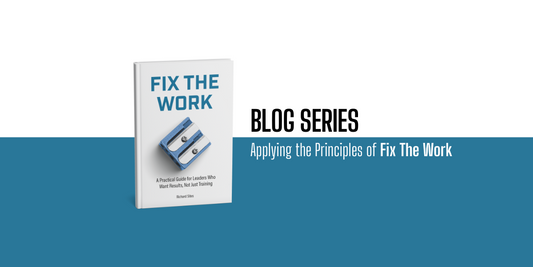We Outsourced Performance. That’s the Problem.
Richard SitesShare This Post
Why managers—not departments—should own how people perform
Somewhere along the way, we started outsourcing performance. Not to consultants. Not to software. But to departments.
The responsibility for how people show up, learn, and perform at work has quietly shifted from managers to HR, L&D, and anyone else we can wedge between a team and its results.
And in doing so, we created an entire industry—one where people design and deliver training without ever being responsible for the actual performance it’s meant to change.
The Rise of “Support Departments”
Let’s call it what it is: most of L&D and HR exists in a support role.
We build systems. We offer tools. We create programs. But we don’t own performance. We don't directly manage the people whose work is being measured. And yet, we’re tasked with fixing it.
That’s a weird setup.
It’s like asking the tech support team to improve product quality because engineers keep making mistakes. They can help. But they’re not in the code.
Training Is Not a Leadership Substitute
Over the years, I’ve seen training requested for almost everything:
- Employees not taking initiative? Let’s build a course.
- Teams missing deadlines? We need time management training.
- Performance reviews going sideways? Toss in some feedback workshops.
In most of these cases, the issue wasn’t a lack of knowledge. It was a lack of leadership. Or accountability. Or consistency.
You can’t train your way out of bad management. But we try. Constantly. Because it’s easier than dealing with the real issue: not enough managers are equipped—or expected—to lead well.
The Accountability Gap
Here’s the core of the problem:
We’ve created a layer of professionals (me included) who are accountable for the delivery of training, but not the results of it.
Meanwhile, managers—the people who should be closest to performance—are often let off the hook.
They’re not expected to coach.
They’re not expected to model good work.
They’re not even expected to know what development their team needs.
So instead, they escalate the issue up and out.
What We Should Be Doing
If we want to actually improve performance, we need to shift our focus.
Instead of building more training programs to patch over management gaps, we should be:
- Hiring better managers
- Giving them the skills and time to lead
- Making sure they’re held accountable for their team’s outcomes
- Supporting them with simple, just-in-time tools—not bloated frameworks
- Embedding development into their day-to-day, not outsourcing it
This isn’t an anti-L&D take. It’s a pro-manager one. Because when managers are empowered to lead, training becomes a complement—not a crutch.
I’ve Seen the Other Side
I’ve led teams where performance was a manager’s responsibility—and the difference was immediate.
Conversations got sharper. Coaching became routine. And training requests? They got smarter. More targeted. More meaningful.
When a manager owns the outcome, they don’t ask for a 60-minute module. They ask for the thing that helps.
And when L&D partners with that kind of manager, magic happens. Because now, you’re solving problems together—not passing them around like a hot potato.
The Bottom Line?
Performance doesn’t live in a department. It lives between a manager and their team.
L&D can help. HR can support. But if managers aren’t committed, trained, and held responsible for team performance, no amount of training will fix it.
We don’t need more courses.
We need more leadership.




